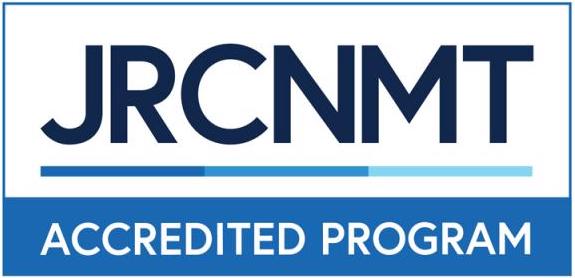
The Master of Science in Nuclear Medicine and Molecular Imaging Sciences (NMMIS) program is the 1st program in the United States to rise to a Master's entry-level status and is the only program of its kind in the state of Alabama..
Our personalized program is dedicated to prepare the next generation of leaders in our field through clinical innovation, safety management, and research discoveries.
New Specialty Tracks
Continuing our tradition of excellence in education, we now offer three specialty tracks - we call this Nuclear Medicine +
-
Imaging Specialist Track
- The Imaging Specialist Track is geared towards training the next generation of imaging and therapy leaders.
- This customized track will equip you with the didactic and clinical training in not only nuclear medicine technology but computed technology and magnetic resonance imaging.
- The Imaging Specialist track culminates in a non-thesis research spanning two semesters.
- Upon completion of the program, you will have the option to sit for board certification exams including those offered by the Nuclear Medicine Technology Certification Board (NMTCB) for becoming a certified nuclear medicine technologist (CNMT) and a certified computed tomography technologist (NMTCB(CT)). You will also be eligible to sit for the board certification exam offered by the American Registry of Radiological Technologists (ARRT) allowing you to also become a certified nuclear medicine technologist (ARRT(N)). In addition, you will be prepared for the didactic portion required to sit for the certification exam in magnetic resonance imaging, with an option for further clinical training in the area.
-
Radiation Safety Officer Track
- The Radiation Safety Officer Track is uniquely geared towards training the next generation of radiation safety leaders.
- In addition to receiving the didactic and clinical training to specialize in nuclear medicine technology, this customized track also allows you to train in nuclear medicine radiation protection in conjunction with UAB’s Health Physics program.
- The Radiation Safety Officer track culminates in a non-thesis research spanning two semesters.
- Upon completion of the program, you will have the option to sit for board certification exams including those offered by the Nuclear Medicine Technology Certification Board (NMTCB) for becoming a certified nuclear medicine technologist (CNMT) and the American Registry of Radiologic Technologists (ARRT) for becoming a certified nuclear medicine technologist (ARRT(N)). After completion of the required post-graduation field experience, you will be eligible to sit for the exam offered by the American Board of Science in Nuclear Medicine recognized by the United States Nuclear Regulatory Commission (USNRC) to work as a radiation safety officer.
-
Research Track
- The Research Track is uniquely designed to train the next generation of research leaders in the field of nuclear medicine technology and molecular imaging sciences.
- The track culminates in thesis research in the final semester which requires coordination with the UAB Graduate School, forming a research committee, and dissertation requirements.
- Upon completion of the program, students have the option to sit for board certification exams offered by the Nuclear Medicine Technology Certification Board (NMTCB) for becoming a certified nuclear medicine technologist (CNMT) and the American Registry of Radiologic Technologists (ARRT) for becoming a certified nuclear medicine technologist (ARRT(N)). You will be able to work as a research scientist with specialized skills or pursue graduate studies in doctoral programs.
NOTE: You must make a decision to follow one of the three tracks before the end of your first term. You may not move between tracks once your decision is official.
Program Highlights
-
3-Semester Mentored Clinical Practice
We offer a three-semester mentored clinical practice experience in the fields of medical nuclear imaging technology, computed tomography, and radionuclide therapeutic applications at one of the UAB affiliated clinical sites.
-
Options for Advanced Training
In your fourth semester, you have the option for advanced training in one of many optional areas:
- Nuclear medicine technology, computed tomography, and magnetic resonance imaging (Imaging Specialist track)
- Radiation Protection (Radiation Safety Officer track)
- Thesis research (Research track)
-
Options for Board Exams
Upon graduation, you have the option to sit for board exams offered by:
- American Registry of Radiologic Technologists – ARRT(N)
- Nuclear Medicine Technology Certification Board – NMTCB
- American Board of Science in Nuclear Medicine – ABSNM.
-
Options for Careers
Upon graduation, your career options include working as clinical imaging technical specialist, nuclear regulatory commission license eligible radiation safety officer, or as an independent researcher, all in the highly advanced field of nuclear medicine and molecular imaging sciences.
-
Access to Cutting-Edge Equipment
Our students have access to UAB’s advanced imaging and research facilities including the state-of-the-art PET/MR fusion system, one of the most powerful cyclotron at any U.S. academic medical center, as well as the various UAB core research instrument facilities including confocal imaging, electron microscopy, and flow cytometry.
-
Access to Industry Experts
Program personnel include two SNMMI-TS Professional Society former and present president and president-elect individuals, one former editor-in-chief of the JNMT, credentialed and experienced eminent didactic and clinical faculty, and a research advisory board composed of renowned experts in the fields of nuclear medicine and molecular imaging, and radiation research.
Specialized Degree
We are a highly specialized diagnostic and therapy degree. You will be entering a profession which utilizes radionuclides to image and treat disease in the body and is ranked among the Top 20 “Best Healthcare Jobs” according to U.S. News & World Report. Your field, which began in the 1950s as a peaceful use of radioactive material, is a premier molecular imaging tool that physicians use to diagnose, stage and treat disease.
For additional information, you can email
Careers & Patients
Check out the videos below from the Society of Nuclear Medicine and Molecular Imaging. Learn about the exciting career opportunities available for graduates of the program and witness the healing power of nuclear medicine therapies - or radiopharmaceutical therapies - through the words of our patients.
Nuclear Medicine Careers
It is an exciting time to become a nuclear medicine technologist! Hear more about the different paths to a career in nuclear medicine.
Nuclear Medicine Patients
Follow three patients as they experience nuclear medicine therapies treating neuroendocrine tumors, thyroid cancer, and prostate cancer.
Professional Licensure and Certifications
Upon Graduation the student is eligible for board exam for certification with both the American Registry of Radiologic Technologists (ARRT) and the Nuclear Medicine Technology Certification Board (NMTCB). State Licensure is variable. For up to date information on state licensure requirements and requirements by state please visit the Professional Licensure and Certification General Disclosures webpage for more information on state and territories requirements. Students completing the Radiation Safety Officer Track will be eligible to sit for the exam offered by the American Board of Science in Nuclear Medicine following completiong of post-graduation field experience.
Disclaimer: Eligibility to take either national certification exam in CT requires certification in nuclear medicine technology, radiography or radiation therapy first.
Program Accreditation
 The NMMIS program curriculum is accredited by the Joint Review Committee on Educational Programs in Nuclear Medicine Technology (JRCNMT).
The NMMIS program curriculum is accredited by the Joint Review Committee on Educational Programs in Nuclear Medicine Technology (JRCNMT).
Post-Baccalaureate Accreditation approval is maintained through 2024 from the JRCNMT.
Graduate achievement data is an indicator of program effectiveness, demonstrating the extent to which a program achieves its goals. The current report on graduate achievement data, identified by program, is available on the JRCNMT website by clicking on the following link: Graduate Achievement Report.